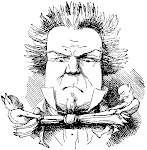One of the great political ironies of the National Party policy positions is the insistence on the mantra that the State should get out of people’s lives along with the pejorative appellation “the Nanny State” while, at the base of every pronouncement on social policy is the implicit understanding that under a National Government surveillance by the State would be acceptable as a means of cutting costs, of reducing “dependence on the tax payer”, of “ensuring transparency in the allocation of “taxpayers’ resources” or the provision of instant solutions to any issue a well funded lobby group or poll driven policy decision demands.
The use of the political double speak by speakers of Engkeylish canvassed in earlier blogs is a classic example of the campaign to reconcile the incompatible.
The problem for Engkeylish is the moral righteousness of the right demands, expects and insists on the imposition of the weight of the state on those who contribute most to the nett wealth of the country - the wage and salary earners - while relaxing the “cost of compliance” on those whose wealth comes from speculation and gambling on the money markets while attempting to persuade the voters that such policy dichotomies are rational.
This is one of the contradictions that make up the psyche and consequent policies of the National Party which allows them, with the aid of a compliant newspaper or two, to label a Labour led Government as “Helengrad” controlled and being a “Nanny state” while harbouring and encouraging their own stasi like mechanisms to harass and bully those who become dispossessed, disenfranchised and constrained as a result of cut backs and reductions in Government investment in infrastructure and policies designed to support and encourage people while promoting the growth of the country.
We saw the effects of such policies under Muldoon, under Richardson (as the author of the “mother of all budgets” ) , under Bolger and Shipley and in the shadowy figures who backed Brash - so one must ask: “How can one believe that under Key, the Pretender of policy, anything will change? The belief system of protect the self interested over the best interests of the country as a whole is too entrenched within the National Party to change even though the political cosmetics being applied may have a slightly paler blue shading emphasised as the election campaigning gathers momentum.
Subscribe to:
Post Comments (Atom)

No comments:
Post a Comment